- Home
- Cecelia Ahern
Cecelia Ahern Short Stories Page 4
Cecelia Ahern Short Stories Read online
Page 4
He reminded Mags of her five brothers with his cheeky smile and overconfident stroll. She could see him demanding food on the table, hot water for his bath and freshly washed clothes every morning just like the boys. He leaned against the confessional box and watched all the single girls from the village being led in a neat line up the aisle by their mothers. The stone floor beneath his feet was scattered with muddy clumps as the muck on the soles of his leather boots dried, cracked and fell to the floor. So Mags felt far from upset when she watched him walk down the aisle with Katie McNamara that year. As all the women had watched the bride and gasped in awe at her dress as she passed, Mags had more interest in watching the soles of Seamus’s feet as he walked away out of the church a married man. Her suspicions had been correct. The mud cracked and fell with every step. To Mags, an obvious sign of what future lay ahead for poor Katie McNamara.
Mags wanted to find a man with shiny shoes, a man who didn’t sweat for a living. If such a creature existed in Kilcrush.
Her mother had been visibly devastated and had dabbed at her eyes throughout the wedding ceremony, claiming to be ‘so happy for Seamus and Katie’ between sniffles. Mags didn’t think it was her posture or her smile or her hair or her walk or her conversation or any of the other things her mother claimed it was that drove him away. Mags didn’t think Seamus even cared about any of those things. He had explained to Grainne that it was Katie’s ‘healthy glow’ that did it for him. Mags had wanted to grab her mother by the hands and dance and twirl her around the room when she heard that. For, much as she hated that brush scraping the powder onto her skin, it removed the healthy glow that could have imprisoned her in Seamus’s farmhouse.
But, despite her joy at not been chosen by the best boy in the village, it left Mags still a single woman at twenty and, much as her parents prayed for it, Mags’s Calling never came. Not of the sort they wanted, anyway.
Agatha’s sniffing the air brought Mags’s mind back to the present, ‘I STILL CAN’T GET IT, MAGS, SO DON’T WORRY.’
Mags rolled her eyes. ‘There is no smell, Aggie.’
‘HA?’ Agatha yelled squinting her eyes in concentration as though doing so would help her hear. ‘There is no smell. Nobody farted, Aggie. Now stop screaming.’ She raised her voice a little more.
‘IT’S ME BAD EAR, MAGS, WHA?’ Agatha shouted.
That did it. Mags’s blood boiled. She was sick and tired of having to repeat herself, and, not only that, her voice was sore at having to shout at Aggie all day every day. If they weren’t careful Aggie would be deaf and Mags would be dumb from having to raise her voice. ‘THERE IS NO SMELL, AGGIE, OK? I. DID. NOT. FART.’
Agatha jumped, the announcer on stage was silenced and a few chuckles were heard around the hall. Mags’s cheeks went pink again and she thought immediately of how angry her mother would be, just as she had been programmed to.
‘Eh … four and four, farty-four, I mean forty-four, excuse me,’ the bingo caller stuttered.
The hall erupted in laughter and Mags snorted. She quickly grabbed her nose to stop it from happening again. Agatha looked around the room confused and turned to stare at her friend with her hand over her nose. ‘DON’T TELL ME YOU DID IT AGAIN, MAGS. IN THE NAME OF JAYSUS ARE YOU TRYIN’ TO KILL US ALL?’ Agatha yelled, sounding exasperated. This time her words weren’t heard by quite so many people over the sound of all the laughter.
Mags tried to control herself, not wanting to be seen to be enjoying herself at the weekly bingo. She liked to think that it was now something she had to do for her friend Aggie and refused to accept the notion that she looked forward to the few hours every week she spent in the local school hall. Her life was far too interesting to be excited by bingo because … well, that would make her old.
And she wasn’t old.
She was seventy-eight. All the same, she couldn’t wait to tell her Connie when she left the bingo hall. How he would have laughed his heart out at this. Oh, yes, there was a man in the end. Cornelius Kelly was his name and Mags adored that man with all her heart. Still did. She couldn’t wait to tell this story to him.
The bingo caller tried to recover from his embarrassment and when the giggles had died down in the hall he resumed his job. ‘Four and three, forty-three.’
Mags smiled. The year she met her Connie.
She had found a man all right. A real man, not one of those ones her mother kept trying to pair her off with, either. She hadn’t wanted to marry a dirty local and have to spend the rest of her life tending for his every unnecessary need. She wanted to fall in love, she wanted to work—and not the kind of work that involved scrubbing clothes and dishes, sewing socks and buttons and cooking. She wanted to work outside of a house.
So she left Kilcrush in the west of Ireland and headed to Dublin City. The big smoke. Her mother and father had been horrified at the very idea when she told them one evening that she was going to join her best friend from school, who had moved up the previous year. Her mother had been convinced she was one of the ‘funny ones’ and no daughter of hers was going to hang around the likes of her in a city full of sin. Dublin City, they said, was not designed for a single woman.
Her parents wouldn’t hear of it.
So she didn’t tell them.
With the money she had saved from selling eggs from the hen her father had given her for her twenty-first (and selling the hen) and a small amount of farm produce at the local market, she bought a train ticket and disappeared into the night. Standing on the pavement on O’Connell Street, she took in the sights, sounds and smells that her new life had to offer. She stared with delight in the great big windows of Clerys department store and had a pain in her neck from standing at the foot of the large granite structure and looking up at Nelson’s Pillar, which she had previously only ever seen in photographs. She breathed in the smoke, the noise, the crowds, the buildings, the trams, so much concrete and such little green—she loved it.
She moved in with her friend Agatha O’Reilly from school to a dark, dingy bedsit in the heart of the city. It was dirty and grotty, noisy and smelly and within days it felt like home to Mags. She took to life very quickly in Dublin. She loved the freedom, she loved being able to go to eleven o’clock mass on a Sunday morning (or Saturday night if she so wished), where she could wear her hair any way she liked it, go barefaced, sit in the back row and yawn to her heart’s content without being struck down by the Lord. She worked Monday to Friday as a chambermaid in a city hotel near the bedsit and she tried to save every shilling she made and stashed it in a box under her bed. She planned to create the best life for herself.
One night the sweet, sweet music that filtered up through the floor of their bedsit from the smoky club below made Mags and Aggie sit up in bed and listen. The voice of an angel accompanied by the tinkling sound of a piano flowed like warm silky caramel through their ears. Mags closed her eyes and pictured herself and Fred Astaire dancing around the room. It was music so unlike anything she had heard in real life. This was the stuff she saw and heard only in the movie theatres she went to occasionally with Aggie. It wasn’t like ‘The Fields of Athenry’, which she was used to hearing sung in the pubs and at parties at home. There was no screeching fiddle or banging bodhrán, there were just silky soothing sounds that made her feel as if she was a million miles from home.
Every weekend she was transported to New York City, to a smoke-filled jazz club full of sophisticated, strong, beautiful, confident women, with big made-up eyes, rich sparkling jewels and glitzy dresses that revealed more flesh than any man in Mags’s home town dared to even dream about due to the fear of having to confess immoral thoughts. The kind of woman that inhaled sexily on a cigarette balanced effortlessly between gloved fingers, not a hint of their bright-red lipstick left behind on the cigarette tip. They would laugh flirtatiously as they tipped the ash into the tray right on target without even looking while sipping on a Cosmopolitan, being adored by men, envied by other women, not a care in the world.
The voice called out to her louder and louder week after week until Mags finally felt confident enough to leave the safety of her bedsit in order to explore downstairs. And when she left the room that night she left the Margaret Divine of Kilcrush behind her. For on stage performing was an angel, the stage spotlight acting as a beam from heaven shining on the man who sang as though he were from another world. His eyes sparkled at her as his magic hands glided gracefully over the keys, and he sang with a smile. A smile all for her. He just seemed to glow to Mags; she could hardly take her eyes away from him, couldn’t stop listening to his voice. There was an air of sophistication about him and at the age of twenty-one Mags knew she had already fallen in love with the voice of an angel, and now she had fallen in love with the man. It had been the Calling she had been praying for. His voice calling her to leave her safety net behind and come downstairs.
He was smart and friendly and funny and listened to Mags’s stories, laughed at her jokes, seemed interested in her opinions, made her feel loved and intelligent and sexy, and this was all new to her.
They became engaged only weeks later and, as Mags’s parents still refused to visit her in Dublin, she embarked on the train journey to Kilcrush with her love. He made her feel strong, as if she could take on the world and perhaps even her mother.
And, for a woman who didn’t think much of city people and their ways, Mags had never seen her mother so uncomfortable and nervous, so well dressed; she had never seen the cottage look so clean, not even as clean as when the local priest visited. It was as though her mother thought royalty was among them. But Connie was a man of the world. He had seen countries, learned of things Grainne could never teach her daughter or preach to her friends. Mags was surprised to find her mother intimidated by this confident young man who looked at her daughter in a way she found uncomfortable.
While Cornelius became acquainted with the men in the living room, it was required of Mags to help prepare tea with her mother in the kitchen. Her first greeting was a slap across the face. ‘That’s what you get, Margaret Divine,’ her mother said breathlessly while rubbing her hand in her apron as if to try to rid herself of the guilt of the act. ‘That’s what you get for not obeying me, for running off and becoming a scorned woman who hangs around smoky clubs with men like you were some sort of fancy woman,’ she hissed. ‘That’s not the life you were reared to know, not the life your father and I worked hard to provide for you, and this is how you repay us?’ She busied herself making sandwiches, slicing the tomatoes with neat precision, almost obsessive behaviour.
Mags stared at her mother, her eyes glistening from the sting of the slap.
‘Well, Margaret, what have you to say for yourself?’ She stopped slicing the tomato and turned to face Mags, sharp knife in one hand, other hand on hip trying to appear menacing. Margaret saw her then for the first time, for what she really was. A woman who knew very little about the real ways of the world. She realized that the woman who scared her all of her life knew very little at all. Margaret began to laugh, to her own surprise, quietly at first, but then she reached to the very bottom of her soul and found a loud bellyaching laugh that made her eyes run with tears of sadness and relief. This unusual act of disobedience angered her mother even more, and Mags received an even harder slap on the other cheek.
This stopped her laughing immediately but her eyes still glistened with bitter amusement.
‘What have you to say for yourself, young lady?’ her mother said angrily through gritted teeth. Loose grey hairs flailed around wildly as though they celebrated their escape from the tight bun in her head. Her face aged in an instant in Mags’s eyes, sharp knife aimed pointedly at Mags’s face. ‘Well?’ she pressed, the delight of putting her daughter back in her place causing her shoulders to relax a little. Margaret glanced at the small mirror over the kitchen basin, at the small wooden stool that she was forced to sit on for all of her teenage years twice weekly and endure the pain of covering her flushed cheeks. She didn’t know what to say. Margaret caught her reflection in the mirror and her stinging cheeks slowly broke into a sad smile. ‘Why Mother, you seem to have made my cheeks rosy.’
Her comment was greeted with an icy stare. But a shocked one at that. No words came from her mother’s mouth. And, as the unusual silence hung in the air, Margaret turned her back and walked out of the kitchen, out of the cottage and out of the place where her mother had tried to hold such control over her.
She and Cornelius married a few weeks later in a small church in Dublin. Her mother could not bring herself to attend but, for the last time, Mags’s father led her down the aisle of the church, with makeup on her face, up to the front row.
‘Four and seven, forty-seven.’
Mags smiled. The year she and Connie had their first baby.
He had been like an excited child himself when he found out about the pregnancy. He had picked her up and danced her around the living room of their new home, then quickly put her down again with worry, afraid of hurting her and the baby. They had finally managed to gather the money together to buy their first home in a new housing estate of brand-new three-bedroom homes in Cabra, Dublin. They had spent the first few years of their married life working all the hours under the sun to help pay for the house, and now they would have an addition. Mags smiled again. She couldn’t wait to talk to Connie later about the day they moved in. She loved doing that. Going over the memories of years gone by with him.
They named their first son Michael after Connie’s father, and over the following years they had three more children. Two more boys, Robert and Jimmy, and one girl, Joyce. A daughter Mags allowed to dress, act and speak for herself just as she pleased. They were all married now. Only Joyce lived in Dublin, the rest were living overseas with their families. They tried to get home as much as they could. Their eldest was now fifty-three years old. Not a baby any more.
‘On its own, number eight.’
The number of her grandchildren.
She couldn’t wait to finish up here and talk to Connie. She still loved him with all of her heart and every time she thought of him butterflies fluttered around her tummy. He used to work at the bingo hall until a few years ago, when the arthritis in his hands became too bad. He had missed playing the piano so much and Mags missed listening to him as she played her bingo. It was nice to hear his familiar sounds in the background and she liked being able to look up and watch him when he didn’t know she was looking. His face furrowed in concentration as he played the tunes he had been playing for over fifty years. They had never been able to find a replacement piano player. But there was no one near as good as Connie anyway …
Her thoughts diminished as she stared down at her card.
‘Oh,’ she said quietly with surprise.
‘Wha’?’ Aggie yelled.
Mags smiled at her lifelong friend. ‘I got bingo, Aggie.’ She clapped her hands together with glee.
‘You got wha’?’
‘Bingo, Aggie.’ She rolled her eyes. Here she goes again.
‘Ha?’
‘For the fiftieth time, I said I got Bingo! she yelled, the veins in her forehead throbbing from the volume of her voice.
The room stopped what they were doing and stared at her. ‘I’m so, so sorry, Ms Divine,’ the bingo caller said, startled. ‘I’m afraid I didn’t hear you the first time. Would you like to come up and collect your prize? You’ve won ten euro. Everybody give Mags a round of applause.’
Mags’s cheeks blushed as she slowly stood up from her chair and made her way shakily up to the
stage. Her hip was at her again. Wait till Connie heard all her good news today, she thought happily, accepting the crisp ten-euro note.
Mags said her goodbyes to Aggie, eventually settling on just a wave after Aggie had questioned Mags’s ‘goodbye’ over and over again. Glowing from her win, she stopped at her local newsagent and bought a small bouquet of flowers, €1.99 for a bunch. She opened the gate and walked up the path to her husband. Seeing him in the distance, she started to explain. ‘Oh, Connie, you’ll never believe the day I’ve had. I won ten euro in the bingo and poor old Aggie accused me of farting in front of everyone.’ Mags laughed at the memory. ‘Well these are for you,’ she said, thrusting the pretty flowers towards him. She placed them on the grass of her husband’s grave. ‘I miss you, love,’ she said, her eyes filling with tears. ‘I miss you so much. This life’s not designed for old single women at all.’
5 The End
Let me tell you what this story is about before I get into the finer details. That way you can decide whether you want to read it or not. Let this first page be like my synopsis. First of all, let me tell you what this story is not: this is not an ‘and they all lived happily ever after’ story; it’s not about lifelong friendships, the importance of female relationships; there are no scenes of ladies whispering and sharing stories over cups of coffee and plates of cream cakes they swore to themselves and their weekly Weight Watchers class they wouldn’t eat. Drunken giggles over cocktails do nothing to dry the tears or save the day in this story.

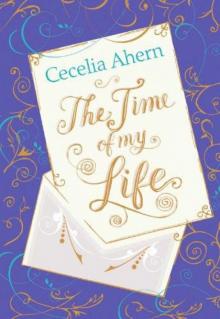 The Time of My Life
The Time of My Life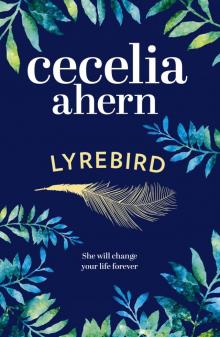 Lyrebird
Lyrebird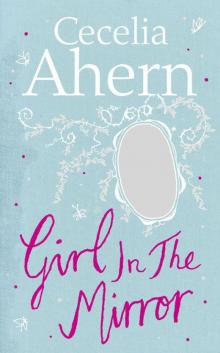 Girl in the Mirror
Girl in the Mirror Perfect
Perfect One Hundred Names
One Hundred Names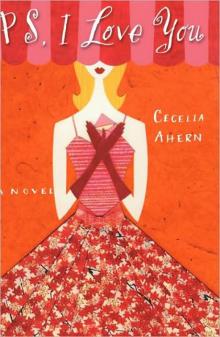 PS, I Love You
PS, I Love You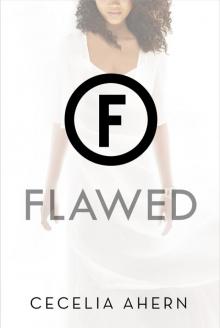 Flawed
Flawed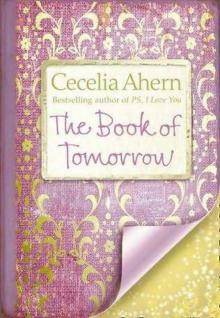 The Book of Tomorrow
The Book of Tomorrow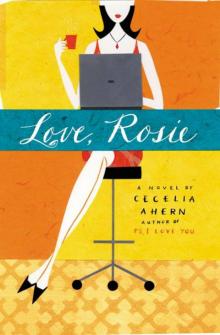 Love, Rosie
Love, Rosie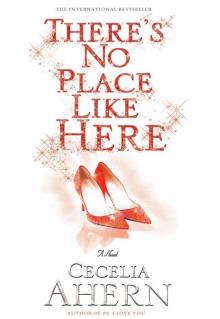 A Place Called Here
A Place Called Here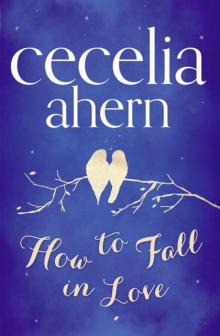 How to Fall in Love
How to Fall in Love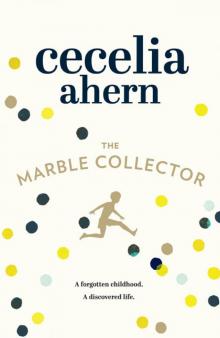 The Marble Collector
The Marble Collector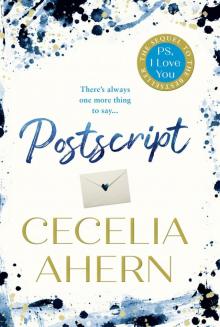 Postscript
Postscript The Gift
The Gift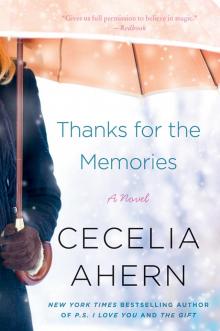 Thanks for the Memories
Thanks for the Memories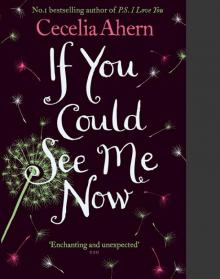 If You Could See Me Now
If You Could See Me Now Roar
Roar Cecelia Ahern 2-book Bundle
Cecelia Ahern 2-book Bundle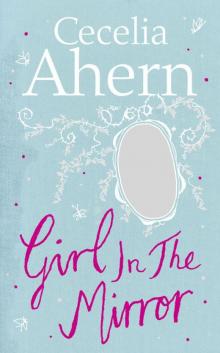 Girl in the Mirror: Two Stories
Girl in the Mirror: Two Stories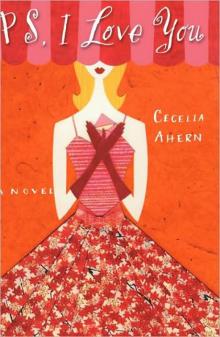 PS, I Love You: A Novel
PS, I Love You: A Novel Cecelia Ahern Short Stories
Cecelia Ahern Short Stories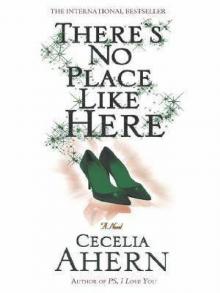 There’s No Place Like Here
There’s No Place Like Here